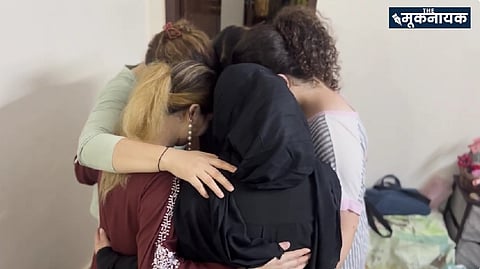
— ✍️ Aakriti Dhawan
New Delhi- For decades, India has been a beacon of relief for Afghans fleeing relentless conflict. But since the Taliban's 2021 takeover, the influx has surged dramatically. Startling figures reveal over 60,000 Afghans have sought asylum or visa extensions in the past three years. Yet, for most, India has shifted from a safe haven to a mere "waiting room," where the shadow of an uncertain future looms large.
For an exclusive conversation with The Mooknayak in Delhi, we spoke to Afghan women who escaped the Taliban's oppression, only to grapple with new hardships here. Fatima (name changed for privacy), a 27-year-old who fled Kabul in 2017 without telling her father, now lives in a modest South Delhi colony with her 3-year-old daughter.
"The situation in Afghanistan was never safe for girls, it wasn't right. It's even worse now. No girl is safe there; life was about to be ruined. That's why I came. Bombs were blasting everywhere, near our home, at the police academy, killing so many. It happened daily," she shares, her voice heavy with memories.
Arriving in India was a challenge in itself for Fatima. Reflecting on the Taliban's return, she says, "When they came, I felt even more scared. It was strange like, what would the world think? They shut down girls' runs, schools, everything to show off to the world. It made me feel ashamed of my own country. I just wanted to live freely. India has always been Afghanistan's friend; they don't want to end that bond, no matter what. But the Taliban has tarnished our nation's name. Look at Afghanistan's state now."
Thousands like Fatima have sought refuge in India, often with UNHCR support for asylum. But Muslim Afghans are barred from citizenship under India's Citizenship Amendment Act (CAA), closing doors to permanence and forcing many to treat India as a "pit stop" en route to elsewhere.
Take Naseeb and Nisha, a couple in Lajpat Nagar with their three sons and a cat. They've been here six years. Naseeb explains their daily battles: "We've had one UNHCR interview, but our biggest issue? We can't even get a SIM card. They say get an Aadhaar or PAN, but we can't. No bank account means no EMIs. Money from abroad comes via others, we pay 2-10% commissions just to receive it. We can't buy a car or house in our name; nothing."
Nisha adds, "The Taliban promised to reopen schools and give women opportunities in an 'Islamic framework.' But after four years, who believes them? We're just waiting to move on."
India hosts one of the region's largest Afghan diasporas, yet its refugee policy remains rigid. With Taliban Foreign Minister Amir Khan Muttaqi's recent visit to New Delhi, the community holds its breath. Will this diplomatic thaw bring hope or deepen the despair? For Afghan women, the fight is twofold: escaping the Taliban's clutches, only to face economic strain, insecurity, and a haunting sense of invisibility in a nation that doesn't formally recognize them as refugees.
Will India open a permanent door for Afghans, or will this wait stretch into eternity? Watch The Mooknayak's report and share your thoughts.
- The author is an independent journalist living in Hamburg Germany. She covers beats such as cross cultural relations, gender, politics and crime. She’s also the host of Beyond Borders Podcast.
Watch the video report here:
You can also join our WhatsApp group to get premium and selected news of The Mooknayak on WhatsApp. Click here to join the WhatsApp group.